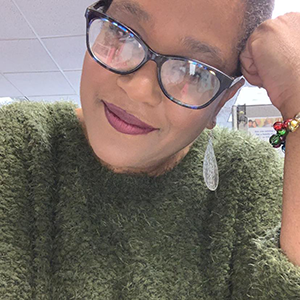
(Posted 2025 January)
Meet Kendra Lee, Hospital Accompaniment Support Advocate
 Tell us a little about yourself. What is your professional background? I am a communications specialist in Fairfax County’s Department of Family Services, where I have worked for a little more than seven years, supporting the Domestic and Sexual Violence Services division. I also run my own media consulting company. I’m a journalist by trade and training, and though I’m no longer doing this full-time, I say journalists are like the Marines: once a journalist, always a journalist.
Tell us a little about yourself. What is your professional background? I am a communications specialist in Fairfax County’s Department of Family Services, where I have worked for a little more than seven years, supporting the Domestic and Sexual Violence Services division. I also run my own media consulting company. I’m a journalist by trade and training, and though I’m no longer doing this full-time, I say journalists are like the Marines: once a journalist, always a journalist.
How long have you been volunteering? What led to your initial desire to volunteer and serve others? I’ve volunteered much of my life, mainly at church and one-off kinds of events. My parents volunteered and often took me, so it seems as natural and normal as breathing.
What interested you in volunteering with Fairfax County’s Domestic and Sexual Violence Services? Until I started working in the county, I didn’t know the vast array of resources and services survivors of interpersonal violence could access. I’m a survivor, and I muddled through on my own. I wish I’d had a HASA volunteer to walk me through the process and explain my options. I want to help be that link I missed when I went through this.
What is the most challenging part of volunteering? How did you overcome this challenge? I worry about saying the wrong thing to a survivor during a terribly traumatic time in their life. But as the cliché goes, practice makes perfect.
What’s the best part of volunteering? Share your most memorable experience. Knowing some small thing I do or say may help someone start healing. And knowing DSVS staff—and the division’s large cadre of volunteers—is experienced and has my back when I’m unsure of the exact information I should impart. Call me crazy, but my most memorable experience is having my HASA go-bag ready and going over my notes just before every on-call shift. I get an adrenaline rush while preparing! I think I’ll always remember my very first accompaniment because of this amped-up state. It was the middle of the night. The survivor was shaking after their experience; I was shaking from pent-up energy. Even hours after I came home, I was still wide awake and processing—and hoping I’d done everything I could to give the survivor all the information they needed.
What has been your favorite training? What did you like about it? What did you learn? I loved role playing; it reinforced the “classroom” training with real-world scenarios.
What are your three greatest strengths? How have you been able to display and use these strengths when serving others? To be honest, this question stumps me. What I think are my greatest strengths—listening, communication, persistence—might not be what others think are my strengths. That said, listening and communication are essential to supporting someone going to the hospital after abuse or an assault. And persistence is crucial to finding answers to something when a situation not in our training manual presents itself.
What advice do you have for people who may be thinking about becoming a DSVS volunteer? Don’t do what I did and waste precious time waiting for the perfect moment to volunteer. I should’ve signed up to do this at least six years ago. Make like Nike says and just do it!
What do you wish you could do more of as a volunteer? More networking with the other volunteers is on my wish list. But I’m baby HASA, so that’ll come.
What are some of your hobbies and interests? I love reading, traveling, shopping, horror movies, and dancing when nobody’s looking. I’m also pretty good at playing like I play cello. And I’m learning Korean.
This article posting is part of the Domestic and Sexual Violence Services' Volunteer Voices monthly newsletter for current and potential volunteers. If you're not already a volunteer, learn how to get involved. Find out about upcoming trainings, volunteer trainings, happenings around the DSVS office and information about articles, books, media recommendations and more.
Learn more about the Domestic and Sexual Violence Services (DSVS).

